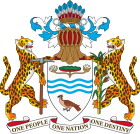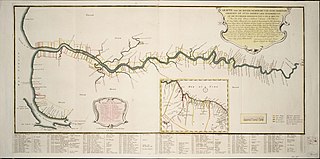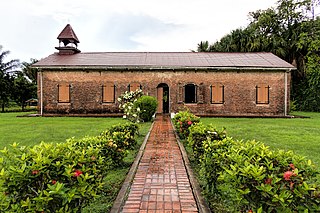 |
|---|
| Constitution |
General elections were held in British Guiana in 1897. [1]
 |
|---|
| Constitution |
General elections were held in British Guiana in 1897. [1]
The elections were held under the 1891 constitution, which provided for a 16-member Court of Policy, half of which was elected. The Court included the Governor, seven government officials (the Attorney General, the Government Secretary, the Immigration Agent General and the Receiver General, together with three other appointees). The eight elected members were elected from seven constituencies; [2] Demerara East, Demerara West, Essequebo North Western, Essequebo South Eastern, Berbice, City of Georgetown (2 members) and New Amsterdam. [3]
In addition, six "Financial Representatives" were also elected in six single member constituencies; Demerara, Essequebo North Western, Essequebo South Eastern, Berbice, Georgetown and New Amsterdam. [3] Together with the Court of Policy, the two groups formed the Combined Court. [2]
The franchise was restricted on the basis of a minimum income level, and women could not vote. [2] The 1897 elections saw the introduction of the secret ballot. [4]
The elections saw a strong campaign to get non-white representation in the Court of Policy. [5] The Progressive Association supported several candidates, including Andrew Benjamin Brown after he was attacked by the white-owned The Echo newspaper. [5] Brown and Patrick Dargan were both supported by Alfred A. Thorne. [5]
Almost all the candidates supported by the Progressive Association were elected, including Dargan and Brown. [5]

The politics of Guyana takes place in a framework of a representative democratic assembly-independent republic, whereby the President of Guyana is the head of government and of a multi-party system. Executive power is exercised by the President, advised by a cabinet. Legislative power is vested in both the President and the National Assembly of Guyana. The judiciary is independent of the executive and the legislature.
The history of Guyana begins about 35,000 years ago with the arrival of humans coming from Eurasia. These migrants became the Carib and Arawak tribes, who met Alonso de Ojeda's first expedition from Spain in 1499 at the Essequibo River. In the ensuing colonial era, Guyana's government was defined by the successive policies of Spanish, French, Dutch, and British settlers.

British Guiana was a British colony, part of the mainland British West Indies, which resides on the northern coast of South America. Since 1966 it has been known as the independent nation of Guyana.

Cheddi Berret Jagan was a Guyanese politician and dentist who was first elected Chief Minister in 1953 and later Premier of British Guiana from 1961 to 1964. He later served as President of Guyana from 1992 to his death in 1997. Jagan is widely regarded in Guyana as the Father of the Nation. In 1953, he became the first Hindu and person of Indian descent to be a head of government outside of the Indian subcontinent.

Demerara is a historical region in the Guianas, on the north coast of South America, now part of the country of Guyana. It was a colony of the Dutch West India Company between 1745 and 1792 and a colony of the Dutch state from 1792 until 1815. It was merged with Essequibo in 1812 by the British who took control. It formally became a British colony in 1815 till Demerara-Essequibo was merged with Berbice to form the colony of British Guiana in 1831. In 1838, it became a county of British Guiana till 1958. In 1966, British Guiana gained independence as Guyana and in 1970 it became a republic as the Co-operative Republic of Guyana. It was located around the lower course of the Demerara River, and its main settlement was Georgetown.

Elections in Guyana take place within the framework of a multi-party representative democracy and a presidential system. The National Assembly is directly elected, with the nominee of the party or alliance that receives the most votes becoming President.
Stabroek was the old name of Georgetown, Guyana, between 1784 and 1812, and was the capital of Demerara. Stabroek is currently a ward in the centre of Georgetown.
The Railways of Guyana comprised two public railways, the Demerara-Berbice Railway and the Demerara-Essequibo railway. There are also several industrial railways mainly for the bauxite industry. The Demerara-Berbice Railway is the oldest in South America. None of the railways are in operation in the 21st century.

The Colony of Demerara-Essequibo was created on 28 April 1812, when the British combined the colonies of Demerara and Essequibo into the colony of Demerara-Essequibo. They were officially ceded to Britain on 13 August 1814. On 20 November 1815 the agreement was ratified by the Netherlands. On 21 July 1831 Demerara-Esequibo united with Berbice as British Guiana.

General elections were held in British Guiana on 15 October 1926.

General elections were held in British Guiana on 19 October 1921.

General elections were held in British Guiana in 1916.

General elections were held in British Guiana in 1911.

General elections were held in British Guiana in 1906.

General elections were held in British Guiana in 1901.

General elections were held in British Guiana in 1892.

The Progressive Association was a political party in British Guiana.

The Combined Court was the legislature of British Guiana until 1928. In its final form, it consisted of a sitting of the Court of Policy together with the elected Financial Representatives.

The Court of Policy was a legislative body in Dutch and British Guiana until 1928. For most of its existence it formed the Combined Court together with the six Financial Representatives.